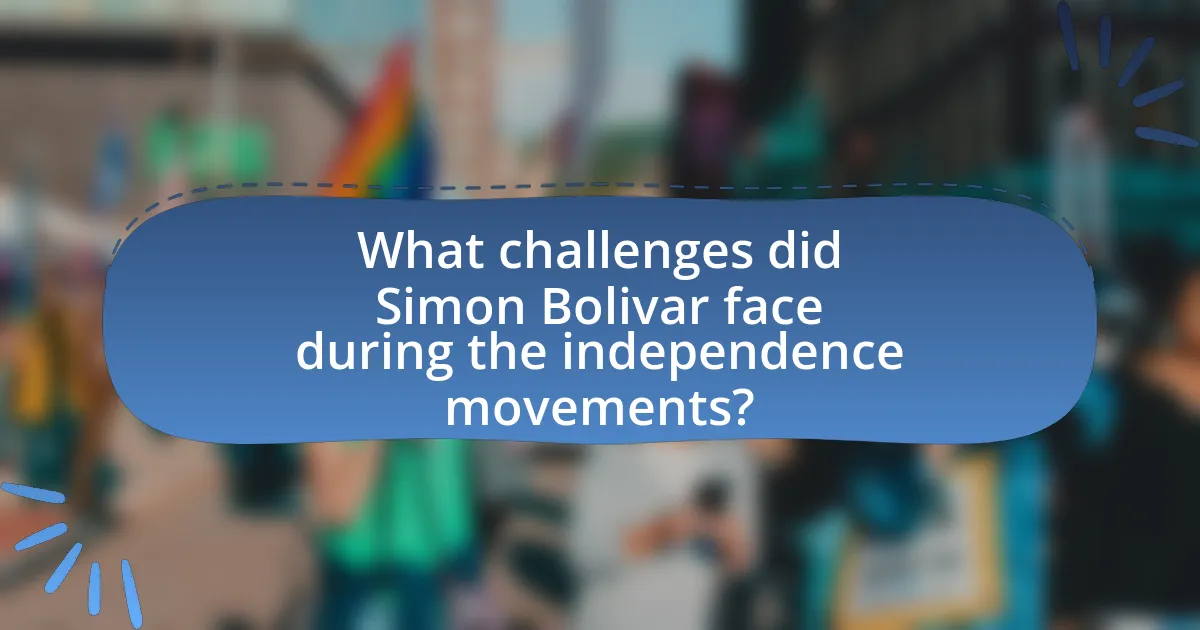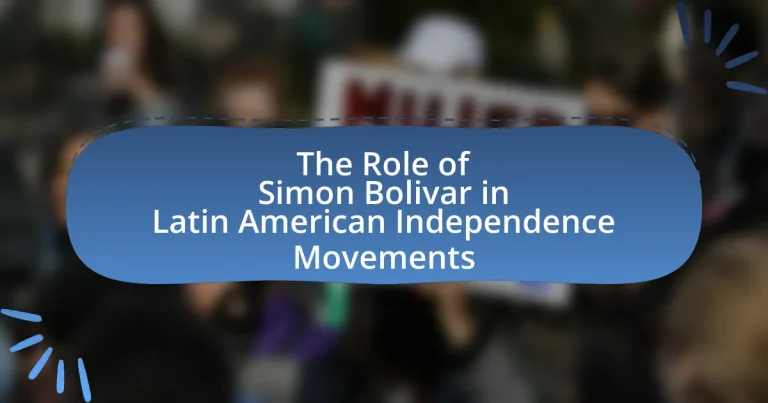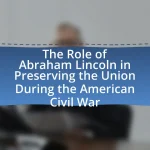Simon Bolivar was a crucial leader in the Latin American independence movements, instrumental in liberating countries such as Venezuela, Colombia, Ecuador, Peru, and Bolivia from Spanish colonial rule. His early life, shaped by Enlightenment ideals and experiences of social injustice, influenced his revolutionary vision for a united Latin America. The article explores Bolivar’s military strategies, political aspirations, and the challenges he faced, including internal conflicts and external pressures. It also examines his legacy, highlighting how contemporary leaders draw inspiration from his ideals of unity, social justice, and anti-imperialism in ongoing movements for change across the region.

What was the significance of Simon Bolivar in Latin American independence movements?
Simon Bolivar was a pivotal figure in Latin American independence movements, leading efforts to liberate several countries from Spanish colonial rule. His military campaigns and political vision resulted in the establishment of independent nations such as Venezuela, Colombia, Ecuador, Peru, and Bolivia. Bolivar’s leadership in the early 19th century was characterized by his ability to unite diverse factions and inspire revolutionary fervor, which was crucial in overcoming colonial powers. His contributions are underscored by the creation of the Gran Colombia federation, which aimed to unify the liberated territories, reflecting his commitment to regional integration and democracy.
How did Bolivar’s early life influence his revolutionary ideas?
Simón Bolívar’s early life significantly influenced his revolutionary ideas by exposing him to Enlightenment principles and the injustices of colonial rule. Growing up in a wealthy Creole family in Venezuela, Bolívar received a comprehensive education that included exposure to Enlightenment thinkers like Rousseau and Montesquieu, which shaped his beliefs in liberty, equality, and democracy. Additionally, witnessing the oppression faced by the indigenous population and enslaved Africans under Spanish colonialism instilled in him a strong desire for social justice and independence. These formative experiences laid the groundwork for his later commitment to liberating Latin America from Spanish rule, ultimately leading to his pivotal role in the independence movements across the continent.
What key events in Bolivar’s youth shaped his vision for independence?
Key events in Simón Bolívar’s youth that shaped his vision for independence include his exposure to Enlightenment ideas, the influence of his tutor Simón Rodríguez, and his travels to Europe. Bolívar’s reading of Enlightenment philosophers like Rousseau and Voltaire instilled in him the principles of liberty and equality. His tutor, Rodríguez, emphasized the importance of education and civic responsibility, further molding Bolívar’s political ideals. Additionally, Bolívar’s experiences in Europe, particularly witnessing the French Revolution, reinforced his desire for independence from Spanish colonial rule and inspired his commitment to liberate Latin America. These formative experiences collectively influenced Bolívar’s revolutionary aspirations and strategies.
How did Bolivar’s education impact his political beliefs?
Bolivar’s education significantly shaped his political beliefs by instilling Enlightenment ideals and a commitment to liberty and equality. His studies in Europe, particularly in France and Spain, exposed him to revolutionary thoughts and philosophies, such as those of Rousseau and Montesquieu, which emphasized individual rights and the importance of civic virtue. This intellectual foundation influenced Bolivar’s vision for a united and independent Latin America, as he sought to apply these principles to the liberation of Spanish colonies from colonial rule. His education not only informed his strategies for independence but also fostered his belief in the necessity of a republic, reflecting the democratic ideals he encountered during his formative years.
What were the main goals of Bolivar’s independence movements?
The main goals of Bolivar’s independence movements were to liberate Latin American countries from Spanish colonial rule and to establish republican governments based on principles of democracy and equality. Bolivar aimed to unite the newly independent nations into a confederation, promoting regional stability and cooperation. His vision included the abolition of slavery and the establishment of civil rights for all citizens, reflecting Enlightenment ideals. Historical evidence shows that Bolivar led military campaigns across Venezuela, Colombia, Ecuador, and Peru, successfully achieving independence for these regions between 1810 and 1825, which underscores his commitment to these goals.
What were Bolivar’s aspirations for a united Latin America?
Simón Bolívar aspired for a united Latin America to create a federation of independent republics that would ensure political stability, economic cooperation, and collective defense against foreign intervention. Bolívar believed that unity among the newly independent nations was essential to prevent the return of colonial powers and to foster regional prosperity. His vision was articulated in various speeches and writings, including the famous “Letter from Jamaica” in 1815, where he expressed the need for a confederation similar to the United States, emphasizing that “the unity of the Americas is the only way to achieve true independence.”
How did Bolivar envision the political structure of liberated nations?
Simón Bolívar envisioned the political structure of liberated nations as a republic characterized by a strong central government, which he believed was essential for maintaining order and unity. Bolívar argued for a system that included a separation of powers among the executive, legislative, and judicial branches to prevent tyranny and ensure democratic governance. He also emphasized the importance of popular sovereignty, advocating for the involvement of the citizenry in political processes, as reflected in his writings and speeches, such as the Angostura Address in 1819, where he articulated his vision for a representative government that would reflect the will of the people.
What strategies did Bolivar employ to achieve independence?
Simón Bolívar employed military, political, and diplomatic strategies to achieve independence for several Latin American countries. Militarily, he led numerous campaigns against Spanish forces, utilizing guerrilla tactics and forming alliances with local leaders to strengthen his army. Politically, Bolívar advocated for the establishment of republics and sought to unify the newly independent territories under a single government, as evidenced by his efforts to create Gran Colombia. Diplomatically, he engaged with foreign powers to gain support and recognition for the independence movements, notably securing assistance from Haiti. These strategies collectively contributed to the successful liberation of territories such as Venezuela, Colombia, Ecuador, and Peru from Spanish colonial rule.
What military tactics did Bolivar use in his campaigns?
Simón Bolívar employed several military tactics in his campaigns, including guerrilla warfare, rapid troop movements, and strategic alliances. Guerrilla warfare allowed Bolívar to engage in hit-and-run tactics against larger Spanish forces, exploiting the terrain of the Andes to his advantage. His ability to move troops quickly enabled him to surprise enemy forces, as seen in the Battle of Boyacá in 1819, where his forces decisively defeated the Spanish. Additionally, Bolívar formed alliances with local leaders and indigenous groups, which strengthened his military position and expanded his support base during the independence movements across Venezuela, Colombia, Ecuador, and Peru.
How did Bolivar’s alliances with other leaders influence the movements?
Bolivar’s alliances with other leaders significantly influenced the independence movements across Latin America by consolidating military strength and fostering regional cooperation. For instance, his collaboration with leaders like José de San Martín facilitated coordinated campaigns against Spanish colonial forces, leading to key victories such as the liberation of Peru in 1821. Additionally, Bolivar’s strategic partnerships with local leaders helped to unify various factions, which was crucial in overcoming regional divisions and ensuring a more cohesive resistance against colonial rule. This collaborative approach not only amplified the military capabilities of the independence movements but also established a framework for future governance in the newly liberated territories.

What challenges did Simon Bolivar face during the independence movements?
Simon Bolivar faced significant challenges during the independence movements, including military defeats, political fragmentation, and lack of resources. Military defeats, such as the loss at the Battle of La Puerta in 1814, undermined his forces and morale. Political fragmentation among various factions in South America complicated unification efforts, as regional leaders often prioritized local interests over a collective independence strategy. Additionally, Bolivar struggled with limited financial and logistical support, which hindered his ability to sustain prolonged military campaigns against Spanish colonial forces. These challenges collectively impacted his efforts to liberate multiple countries in Latin America.
What internal conflicts arose within Bolivar’s forces?
Internal conflicts within Bolivar’s forces primarily stemmed from ideological differences, power struggles, and regional rivalries. These conflicts manifested in disputes over governance, military strategy, and the direction of the independence movement. For instance, Bolivar faced opposition from leaders like José Antonio Páez, who prioritized regional autonomy over Bolivar’s vision of a centralized republic. Additionally, divisions emerged between liberal and conservative factions within the army, complicating unified efforts against Spanish colonial rule. These internal tensions ultimately weakened Bolivar’s forces and hindered the effectiveness of their campaigns for independence.
How did differing ideologies among leaders affect Bolivar’s strategies?
Differing ideologies among leaders significantly influenced Simon Bolivar’s strategies during the Latin American independence movements. Bolivar aimed to unify the newly independent territories under a republican framework, but he faced opposition from leaders who favored regionalism or monarchism. For instance, leaders like José de San Martín advocated for a more conservative approach, which conflicted with Bolivar’s vision of a centralized republic. This ideological divide led Bolivar to adapt his strategies, emphasizing military alliances and political negotiations to counteract fragmentation and promote unity among the liberated regions. The ideological rift ultimately shaped Bolivar’s approach to governance and military tactics, as he sought to reconcile diverse interests while pursuing his goal of a unified Gran Colombia.
What role did betrayal play in Bolivar’s campaigns?
Betrayal significantly impacted Bolivar’s campaigns by undermining alliances and creating internal divisions. Key figures, such as former allies who turned against him, weakened his military efforts and led to strategic setbacks. For instance, the betrayal by General Manuel Piar in 1817 resulted in a loss of trust and support among troops, which hindered Bolivar’s ability to unify forces against Spanish colonial rule. Additionally, the defection of leaders like José Antonio Páez at critical moments further complicated Bolivar’s strategies, illustrating how betrayal not only affected morale but also altered the course of military engagements during the independence movements in Latin America.
How did external forces impact Bolivar’s efforts?
External forces significantly impacted Simon Bolivar’s efforts by shaping the geopolitical landscape and influencing military resources. The support from countries like Britain and the United States provided crucial financial and military assistance, enabling Bolivar to launch campaigns against Spanish colonial rule. Additionally, the political instability in Spain, particularly during the Peninsular War (1808-1814), diverted Spanish resources and attention, allowing Bolivar to capitalize on the weakened colonial authority. Furthermore, the ideological influence of Enlightenment thinkers and the success of the American and French revolutions inspired Bolivar and his contemporaries, reinforcing their resolve for independence. These external factors collectively facilitated Bolivar’s military campaigns and strategic decisions, ultimately contributing to the liberation of several South American nations from Spanish control.
What influence did European powers have on the independence movements?
European powers significantly influenced independence movements in Latin America by both inspiring revolutionary ideas and directly intervening in colonial affairs. The Enlightenment ideals from Europe, such as liberty and equality, motivated leaders like Simon Bolivar to challenge colonial rule. Additionally, the weakening of Spain and Portugal due to the Napoleonic Wars created a power vacuum that allowed for the rise of independence movements across Latin America. The Spanish colonies, for instance, capitalized on Spain’s distraction during the early 19th century to declare independence, leading to a series of revolutions from 1808 to 1826. This context illustrates how European political dynamics directly impacted the momentum and success of independence efforts in the region.
How did the United States’ stance affect Bolivar’s strategies?
The United States’ stance significantly influenced Simon Bolivar’s strategies by providing ideological support for independence movements in Latin America. Bolivar admired the U.S. model of republicanism and sought to emulate its principles in his campaigns against Spanish colonial rule. The U.S. government’s initial support for independence movements encouraged Bolivar to pursue alliances with other revolutionary leaders and to advocate for a unified Latin America, as seen in his vision for Gran Colombia. However, as the U.S. adopted a more isolationist policy in the 1820s, Bolivar faced challenges in securing diplomatic and military support, which ultimately affected his ability to sustain his revolutionary efforts and maintain unity among the newly independent states.
What is Bolivar’s legacy in Latin America today?
Bolivar’s legacy in Latin America today is characterized by his role as a symbol of independence and unity among Latin American nations. His vision for a united Latin America, articulated in his writings and speeches, continues to inspire movements for social justice and political sovereignty across the region. Bolivar’s influence is evident in the establishment of various political ideologies that emphasize anti-imperialism and regional integration, such as the Bolivarian Revolution in Venezuela. His historical significance is reinforced by the numerous statues, monuments, and commemorative events dedicated to him, which serve to remind contemporary societies of the struggles for freedom and self-determination that he championed.
How is Bolivar remembered in contemporary Latin American politics?
Simón Bolívar is remembered in contemporary Latin American politics as a symbol of anti-imperialism and unity among Latin American nations. His legacy is invoked by various political leaders and movements that emphasize sovereignty, social justice, and regional integration, reflecting his vision of a united Latin America free from foreign domination. For instance, leaders like Hugo Chávez in Venezuela and Evo Morales in Bolivia have drawn upon Bolívar’s ideals to justify their policies and promote a sense of national identity. Additionally, Bolívar’s image is frequently used in political discourse, educational curricula, and public monuments, reinforcing his status as a foundational figure in the region’s struggle for independence and self-determination.
What symbols and monuments commemorate Bolivar’s contributions?
Numerous symbols and monuments commemorate Simon Bolivar’s contributions, including the iconic statue of Bolivar in Caracas, Venezuela, which stands in Plaza Bolívar. This statue, created by the sculptor Antonio Guzmán Blanco, symbolizes Bolivar’s role as a liberator of several South American countries. Additionally, the Bolivar Monument in Bogotá, Colombia, honors his legacy and is a focal point for national celebrations. The presence of Bolivar’s image on currency, such as the Venezuelan bolívar, further signifies his enduring influence in the region. These monuments and symbols collectively reflect Bolivar’s pivotal role in the independence movements across Latin America.
How do modern leaders draw inspiration from Bolivar’s ideals?
Modern leaders draw inspiration from Bolivar’s ideals by emphasizing unity, social justice, and anti-imperialism. Bolivar advocated for the liberation of Latin America from colonial rule, promoting the idea that nations should be free and self-governing. His vision of a united Latin America resonates with contemporary leaders who seek regional cooperation and solidarity, as seen in initiatives like the Union of South American Nations (UNASUR). Additionally, Bolivar’s commitment to social equity influences modern leaders’ policies aimed at reducing inequality and empowering marginalized communities, reflecting his belief in the importance of social justice for national progress.
What lessons can be learned from Bolivar’s approach to independence?
Bolivar’s approach to independence teaches the importance of unifying diverse groups for a common cause. He recognized that the struggle for independence in Latin America required collaboration among various social, ethnic, and regional factions. Bolivar’s leadership in forming coalitions, such as the Gran Colombia, demonstrated that a united front could effectively challenge colonial powers. His military strategies, including the use of guerrilla tactics and adaptability to local conditions, further illustrate the need for flexibility in revolutionary movements. Additionally, Bolivar’s emphasis on education and political organization highlights the necessity of fostering civic engagement and informed citizenry to sustain independence efforts.
How can Bolivar’s strategies inform current movements for social change?
Bolivar’s strategies can inform current movements for social change by emphasizing the importance of unity, popular mobilization, and a clear vision for liberation. His approach to rallying diverse groups against colonial powers illustrates the effectiveness of coalition-building in achieving common goals. For instance, Bolivar successfully united various factions in Latin America, which led to significant victories against Spanish rule, demonstrating that collective action can overcome oppression. Additionally, his focus on education and political engagement highlights the necessity of empowering communities to advocate for their rights, a principle that remains relevant in contemporary social movements seeking justice and equality.
What best practices can be derived from Bolivar’s leadership style?
Simon Bolivar’s leadership style exemplifies several best practices, including visionary thinking, adaptability, and the ability to inspire and unite diverse groups. His visionary thinking is evident in his goal of a unified Latin America, which he articulated through his writings and speeches, motivating others to join the independence cause. Adaptability is showcased in his military strategies, where he adjusted tactics based on the unique challenges of different regions, such as the Andes and the plains of Venezuela. Furthermore, Bolivar’s ability to inspire and unite various factions, including Creoles, mestizos, and indigenous peoples, was crucial in overcoming regional divisions, as seen in his formation of the Gran Colombia. These practices highlight the importance of a clear vision, flexibility in approach, and the capacity to foster collaboration among diverse stakeholders in leadership.


